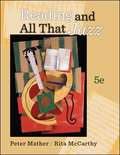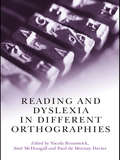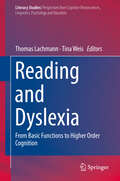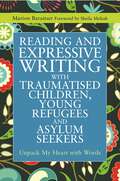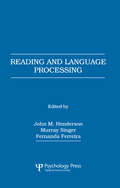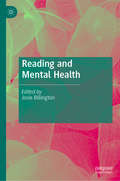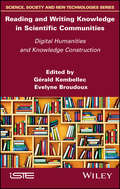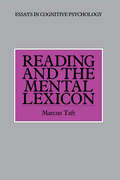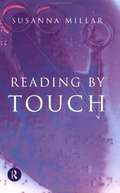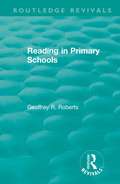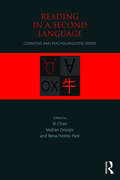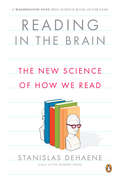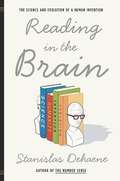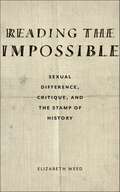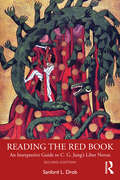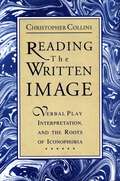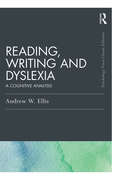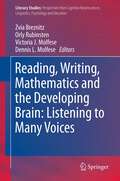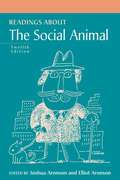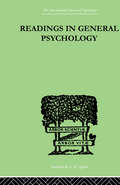- Table View
- List View
Reading and All That Jazz (4th Edition)
by Peter Mather Rita MccarthyThis attractive, engaging introductory-to-intermediate reading text for undergraduates begins by introducing students to study skills and the college environment, with readings on learning styles, different types of intelligence, stress, and other areas that help students understand themselves as learners. The text then broadens the perspective to focus on interpersonal, social, national, and international issues, within sections on discovering meaning through structure, interpreting written material, recognizing modes of writing, reading critically, and getting ready for content-area classes.
Reading and All That Jazz (5th Edition)
by Peter Mather Rita MccarthyReading and All That Jazz, an introductory-to-intermediate reading text, motivates and engages readers with contemporary and relevant readings while building the essential reading skills and vocabulary needed for literal and critical comprehension. With multiple practice opportunities and an adaptive learning plan via Connect Reading, Reading and All That Jazz provides for genuine thinking, assessment, and interpretation.
Reading and Dyslexia in Different Orthographies
by Nicola BrunswickThis book provides a unique and accessible account of current research on reading and dyslexia in different orthographies. While most research has been conducted in English, this text presents cross-language comparisons to provide insights into universal aspects of reading development and developmental dyslexia in alphabetic and non-alphabetic languages. The book brings together contributions from a group of leading literacy researchers from around the world. It begins by examining the development of language skills in monolingual speakers of alphabetic and non-alphabetic languages; it then explores literacy acquisition in bilingual children learning to read in languages with different spelling-sound rules, including English, French, Greek, Welsh and Japanese. The second section is devoted to developmental dyslexia in monolingual and bilingual speakers of different languages and examines the impact of variations in orthography on the symptoms and aetiology of dyslexia. The final section explores the contribution of brain imaging to the study of impaired and unimpaired reading, giving an up-to-the-minute picture of how the brain deals with different languages and writing systems. This is ideal reading for advanced undergraduates and postgraduates who have an interest in language acquisition, reading and spelling, as well as speech and language therapists, teachers and special educational needs professionals.
Reading and Dyslexia: From Basic Functions To Higher Order Cognition (Literacy Studies #16)
by Thomas Lachmann Tina WeisIn this volume a group of well-known experts of the field cover topics ranging from basic visual and auditory information processing to higher order cognition in reading and dyslexia, from basic research to remediation approaches and from well-established theories to new hypotheses about reading acquisition and causes for its failure. Reading is one of the most intriguing feats human evolution ever came up with. There is no evolutionary basis for reading as such; reading is secondary to language and the result of a complex skill acquisition at the end of which almost all pre-existing cognitive functions are mobilized. With the right instruction and practice most people learn this skill smoothly. Some, however, have problems, despite same opportunities and general cognitive abilities. This developmental dyslexia results from a neuro developmental disorder leading to deficits in reading relevant information processing. But what deficits are these, and can they be trained?
Reading and Expressive Writing with Traumatised Children, Young Refugees and Asylum Seekers: Unpack My Heart with Words
by Sheila Melzak Marion BaraitserUnpack my Heart with Words explores how literature can be used to help young victims cope with their experiences. The process of reading, discussing and rewriting carefully selected texts can have a significant therapeutic impact, as the young person identifies his or her own experience in the narrative. This book guides readers through all aspects of implementing biblio/narrative therapy with children and adolescents, from the importance of cultural sensitivity and understanding the psychological needs of the child to providing more practical information on how to choose the right text and encourage expression through the spoken and written word. It includes exercises for use in sessions, an analysis of the importance of symbol when working therapeutically with children, and a complete account of the ethics of good practice. Drawing on the author's innovative work with young asylum seekers and refugees, and with an overview of the latest research in creativity, language and memory, the book provides a comprehensive and practical resource on the use of literature to help young victims regain their dignity and overcome the overwhelmed hurt self. This book will be of immeasurable value to students and practitioners world-wide in arts and health care who work with traumatised young people, including counsellors, clinical psychologists, educational psychologists, teachers, psychotherapists and social workers.
Reading and Language Processing
by Fernanda Ferreira Murray Singer John M. HendersonThis volume was designed to identify the current limits of progress in the psychology of reading and language processing in an information processing framework. Leaders in their fields of interest, the chapter authors couple current theoretical analyses with new, formally presented experiments. The research -- cutting-edge and sometimes controversial -- reflects the prevailing analysis that language comprehension results in numerous levels of representation, including surface features, lexical properties, linguistic structures, and idea networks underlying a message as well as the situations to which a message refers. As a group, the chapters highlight the impact that input modality -- auditory or written -- has on comprehension. Finally, the studies also capture the evolution of new topic matter and ongoing debates concerning the competing paradigms, global proposals, and methods that form the foundation of the enterprise. The book presents current accounts of research on word-, sentence-, and text-processing. It will prove informative for experimental psychologists as well as investigators in cognitive science disciplines such as computer science, linguistics, and educational psychology. The book will also be very helpful to graduate students who wish to develop expertise in the psychology of language processes. For them, it collects, in a single volume, readings that are representative of progress concerning many central problems in the field. As such, it is distinct from the numerous collected volumes that concentrate on a single issue. Complete author and subject indexes facilitate effective use of the volume.
Reading and Mental Health
by Josie BillingtonThis book brings together into one edited volume the most compelling rationales for literary reading and health, the best current practices in this area and state of the art research methodologies. It consolidates the findings and insights of this burgeoning field of enquiry across diverse disciplines and groups: psychologists, neurologists, and social scientists; literary scholars, writers and philosophers; medical researchers and practitioners; reading charities and arts organisations. Following introductory chapters on the literary-historical background to reading and health, the book is divided into four key sections. The first part focuses on Practices, showcasing reading interventions and cultures in clinical and community mental health care and in secure settings. This is followed by Research Methodologies, featuring innovative qualitative and quantitative approaches, and by a section covering Theory, with chapters from eminent thinkers in psychiatry, psychology and psychoanalysis. The final part is concerned with Implementation, incorporating perspectives from health professionals, commissioners and reading practitioners.This innovate work explains why reading matters in health and wellbeing, and offers a foundational text to future scholars in the field and to health professionals and policy-makers in relation to the embedding of reading practices in professional health care.
Reading and Writing Knowledge in Scientific Communities: Digital Humanities and Knowledge Construction
by Gérald Kembellec Evelyne BroudouxPractices associated with the culture of “scholarly” reading have been developed over many centuries and annotations themselves have become the subject of study, either as additional elements in connection with the original texts or as documents in their own right. The first “scholarly” reading techniques, seen historically from the 12th Century onwards, combine reading and writing in a process known as lettrure, involving both attentive reading and commentary. The Internet has transformed this activity, adding technical layers that relate both to the reading and writing process as well as to the circulation of texts; their potential and effective augmentation, diffusion, and reception. This book examines digitized reading and writing by focusing primarily on the conditions for the co-construction of scientific knowledge and its augmentation. The authors present numerous examples of studies and personal feedback concerning the intellectual process, open critical spaces, collaborative scholarly publishing, methods for the circulation and mediatization of knowledge, as well as the techniques and tools employed.
Reading and the Mental Lexicon (Essays in Cognitive Psychology)
by Marcus TaftOver the last twenty years a major area of cognitive psychology has developed centred upon research into the issues of how visually presented words are processed so that they can be read and understood. The focus has been on how words are stored in the mental lexicon and retrieved during the reading process. If we possessed no mental lexicon, we would be unable to read. This book dedicates itself to a critical evaluation of the ideas that have emerged from this body of research. The text outlines the major models of lexical processing that have been put forward in the literature, and how they explain the basic empirical findings that have been reported. It then goes on to consider the possible influence that sentential context has on lexical processing, the impact of the pronunciation of a word on its visual processing, and the role played by internal word structure (i.e., syllables and morphemes) in the recognition of a word. A connectionist style model emerges during the course of the evaluation of these issues.This book is suitable for advanced students and researchers, and is intended to serve as a springboard for discussion and an inspiration for empirical research.
Reading by Touch
by Susanna MillarThe perceptual, linguistic and cognitive processes involved in sighted reading have been widely studied, but the use of touch raises new issues. Drawing on her research with novice and fluent braille readers, Susanna Millar examines how people initially process braille and how skill with sounds, words, meaning and spelling patterns influence processing. The main focus is on braille, but findings on the "Moon" script, vibrotactile devices, maps and icons are also considered in the context of their practical implications and access to computer technology.
Reading for Thinking (4th edition)
by Laraine E. Flemming Ann Marie RadaskiewiczThis book takes a structured approach to the teaching of academic reading skills. Section by section, the book builds on skills such as reading comprehension, summarizing, disseminating, argument analysis, and short essay writing. Each section includes readings to illustrate concepts, and these same concepts are tested with several exercises at the end of each section in the book.
Reading in Primary Schools (Routledge Revivals)
by Geoffrey R. RobertsLearning to read and the teaching of reading have long been surrounded with controversy. Originally published in 1969, this book takes the view that the subject is best approached via linguistic theory. The relationship between reading and spoken language is clearly brought out in the author’s attempt to define more closely the area in which the teacher has to operate when teaching children to read. His analysis of reading problems in children up to the age of 11 will encourage experienced teachers to question constructively their own beliefs and practices, while the book as a whole provides a valuable introduction to the psychology of reading for the student of education.
Reading in a Second Language
by William GrabeThis volume, through a detailed treatment of the cognitive processes that support reading, explains how reading really works. It offers a thorough overview of important and current research, including first language research, which is not often found in second language acquisition (SLA) publications. This book is a true example of applied linguistics; it makes well-defined linkages between theory and practice, discussing the implications and applications of second language reading theories on instructional practices. It is a valuable resource and reference for action researchers, curriculum designers, teachers, administrators, and those interested in exploring theoretical issues grounded in instructional contexts.
Reading in a Second Language: Cognitive and Psycholinguistic Issues
by Xi Chen Rena Helms-Park Vedran DronjicReading in a Second Language offers a comprehensive survey of the phenomenon and process of reading in a second language, with graduate and upper-level undergraduate students in second language acquisition, psycholinguistics, and applied psychology as its primary audience. The book explores reading processes from a number of complementary standpoints, integrating perspectives from fields such as first and second language reading, second language acquisition, linguistics, psycholinguistics, and cognitive neuroscience. The first half examines major factors in second language reading: types of scripts, the cognitive and neural substrates of reading; metalinguistic awareness, word recognition, language transfer, and lexical knowledge. The second part of the book discusses the social and educational contexts in which reading development occurs, including issues related to pedagogy, the use of technology in the classroom, reading disorders, and policy making. Reading in a Second Language provides students with a full, logically organized overview of the primary factors that shape reading development and processes in a second language.
Reading in the Brain: The New Science of How We Read
by Stanislas DehaeneA renowned cognitive neuroscientist?s fascinating and highly informative account of how the brain acquires readingHow can a few black marks on a white page evoke an entire universe of sounds and meanings? In this riveting investigation, Stanislas Dehaene provides an accessible account of the brain circuitry of reading and explores what he calls the ?reading paradox?: Our cortex is the product of millions of years of evolution in a world without writing, so how did it adapt to recognize words? Reading in the Brain describes pioneering research on how we process language, revealing the hidden logic of spelling and the existence of powerful unconscious mechanisms for decoding words of any size, case, or font. Dehaene?s research will fascinate not only readers interested in science and culture, but also educators concerned with debates on how we learn to read, and who wrestle with pathologies such as dyslexia. Like Steven Pinker, Dehaene argues that the mind is not a blank slate: Writing systems across all cultures rely on the same brain circuits, and reading is only possible insofar as it fits within the limits of a primate brain. Setting cutting-edge science in the context of cultural debate, Reading in the Brain is an unparalleled guide to a uniquely human ability.
Reading in the Brain: The Science and Evolution of a Human Invention
by Stanislaus Dehaene"The transparent and automatic feat of reading comprehension disguises an intricate biological effort, ably analyzed in this fascinating study. Drawing on scads of brain-imaging studies, case histories of stroke victims and ingenious cognitive psychology experiments, cognitive neuroscientist Dehaene (The Number Sense) diagrams the neural machinery that translates marks on paper into language, sound and meaning. It's a complex and surprising circuitry, both specific, in that it is housed in parts of the cortex that perform specific processing tasks, and puzzlingly abstract. (The brain, Dehaene hypothesizes, registers words mainly as collections of pairs of letters.) The author proposes reading as an example of neuronal recycling--the recruitment of previously evolved neural circuits to accomplish cultural innovations--and uses this idea to explore how ancient scribes shaped writing systems around the brain's potential and limitations." -Publishers Weekly
Reading the Impossible: Sexual Difference, Critique, and the Stamp of History
by Elizabeth WeedReading the impossible has never seemed less possible. A few decades ago, critical readings could view the collapse of foundationalism optimistically. With meaning no longer soldered onto being, there was hope for all those beings whose meaning had been forever ordained by Nature or the Divine. Critical reading thus became a way of exploring the devious workings of knowledge and power. But as non-foundational systems of meaning have proven to be so perfectly suited to the transactional logics of the market, reading for the impasses of meaning has come to be seen as quixotic, impractical, and dated. To concur with that view, Elizabeth Weed argues, is to embrace the fantasy told by the neoliberal order. To read the impossible is to disrupt that fantasy, with its return to stable categories of marketable identity, in order to contest the inexorable workings of misogyny and racism. This book seeks to disturb the positivity of identity in the hope of retrieving the impossibility of sexual difference, an impossibility that has its effects in the Real of misogyny.A return to the famous debate between Derrida and Lacan on the impossibility of sexual difference yields two different readings of the impossible. In reconsidering these questions, Weed shows how the practice of reading can powerfully stage the wiles of language and the unconscious. In returning to that earlier moment in the context of current debates on the role of reading and interpretation, Weed offers a fresh perspective on what is at stake for critical reading in the neoliberal university.
Reading the Red Book: An Interpretive Guide to C. G. Jung’s Liber Novus
by Sanford L. DrobThe long-awaited publication of C. G. Jung's Red Book in October 2009 was a signal event in the history of analytical psychology. Hailed as the most important work in Jung's entire corpus, it is as enigmatic as it is profound. Reading The Red Book by Sanford L. Drob provides a clear and comprehensive guide to The Red Book's narrative and thematic content, and details The Red Book's significance, not only for psychology but for the history of ideas.
Reading the Written Image: Verbal Play, Interpretation, and the Roots of Iconophobia (G - Reference, Information and Interdisciplinary Subjects)
by Christopher CollinsReading the Written Image is a study of the imagination as it is prompted by the verbal cues of literature. Since every literary image is also a mental image, a representation of an absent entity, Collins contends that imagination is a poiesis, a making-up, an act of play for both author and reader. The "willing suspension of disbelief," which Coleridge said "constitutes poetic faith," therefore empowers and directs the reader to construct an imagined world in which particular hypotheses are proposed and demonstrated.Although the imagination as a central concept in poetics emerges into critical debate only in the eighteenth century, it has been a crucial issue for over two millennia in religious, philosophical, and political discourse. The two recognized alternative methodologies in the study of literature, the poetic and the hermeneutic, are opposed on the issue of the written image: poets and readers feel free to imagine, while hermeneuts feel obliged to specify the meanings of images and, failing that, to minimize the importance of imagery. Recognizing this problem, Collins proposes that reading written texts be regarded as a performance, a unique kind of play that transposes what had once been an oral-dramatic situation onto an inner, imaginary stage. He applies models drawn from the psychology of play to support his theory that reader response is essentially a poietic response to a rule-governed set of ludic cues.
Reading with Muriel Dimen/Writing with Muriel Dimen: Experiments in Theorizing a Field (Relational Perspectives Book Series)
by Stephen HartmanReading with Muriel Dimen/Writing with Muriel Dimen: Experiments in Theorizing a Field is a collection of reading and writing experiments inspired by the late feminist psychoanalyst Muriel Dimen. Each of the six projects that comprise this volume explores a stylistic and thematic manner of reading and responding to Dimen’s work, challenging the field to write outside the standardized edition, and covering a remarkable breadth of essential analytic topics, such as sex, gender, money, love and hate, and boundary violations. As an homage to Dimen’s quest to engage the personal and the political in the author’s craft, and in collaboration with Dimen’s endeavour to foster revolution across the psychosocial landscape that renders psychoanalysis its field, the authors offer readers a wild analysis of reading and writing. Providing a clear introduction to and exploration of Muriel Dimen’s groundbreaking work, this book will prove essential for scholars of psychoanalysis, cultural studies, and gender studies, as well as anyone seeking to understand Dimen’s influence on psychoanalytic practice today.
Reading, Writing and Dyslexia: A Cognitive Analysis (Psychology Press & Routledge Classic Editions)
by Andrew W EllisThis is a classic edition of Andrew Ellis’ acclaimed introduction to the scientific study of reading, writing and dyslexia, which now includes a new introduction from the author. The book describes the remarkable skills of reading and writing – how we acquire them, how we exercise them as skilled readers and writers, and what can go wrong with them in childhood disorders or as a result of brain damage. The new introduction reflects on some key research developments since the book was first published. Reading, Writing and Dyslexia is an engaging introduction to the field which is still completely relevant to today’s readers. It will remain essential reading for all students of psychology and education, whilst also being accessible to parents and teachers.
Reading, Writing and Dyslexia: A Cognitive Analysis (Psychology Press And Routledge Classic Editions Ser.)
by Andrew W. EllisResearch in cognitive psychology has contributed much to our understanding of reading and spelling. Most of this work has concentrated on the processes used by literate adults to comprehend and produce written language, but there is a growing interest in applying cognitive theories to the development of literacy, and to the understanding of disorders of reading and writing. Such disorders may be acquired as a consequence of a brain injury to a previously literate adult, or may be developmental, occurring in otherwise normal children. This textbook attempts to present this work to a non-specialist audience. Though written primarily with students of psychology and education in mind, it is accessible also to parents and teachers. The broad organization of the first edition is retained. The book opens with a consideration of the history and nature of writing, then moves on to deal with the nature of skilled reading. Other chapters deal with: the different ways that brain injury in adulthood can disrupt the mature reading skill the 'acquired dyslexias'; spelling and writing processes, both in skilled writers and in patients with 'acquired dysgraphia'; the way children develop the skills of reading and writing; and developmental reading and writing problems.
Reading, Writing, Mathematics and the Developing Brain: Listening to Many Voices
by Orly Rubinsten Dennis L. Molfese Zvia Breznitz Victoria J. MolfeseThis valuable addition to the literature offers readers a comprehensive overview of recent brain imaging research focused on reading, writing and mathematics--a research arena characterized by rapid advances that follow on the heels of fresh developments and techniques in brain imaging itself. With contributions from many of the lead scientists in this field, a number of whom have been responsible for key breakthroughs, the coverage deals with the commonalities of, as well as the differences between, brain activity related to the three core educational topics. At the same time, the volume addresses vital new information on both brain and behavior indicators of developmental problems, and points out the new directions being pursued using current advances in brain imaging technologies as well as research-based interventions. The book is also a tribute to a new Edmund, J Safra Brain center for the study of learning Disabilities at the University of Haifa-Israel.
Readings About the Social Animal
by Elliot Aronson Joshua AronsonExploring the key ideas in social psychology, this collection of classic and contemporary readings includes accounts of specific experimental findings as well as more general articles summarizing studies on such topics as attraction, prejudice, and aggression. The new edition adds 15 new readings while retaining a number of classics by leading psychological thinkers such as Stanley Milgram on obedience and Solomon Asch on conformity. Readings makes the perfect companion for the Aronson's highly praised book, The Social Animal as it follows the same major themes. The Reader can also be used with any introductory social psychology text or even in lieu of a text. Using both The Social Animal textbook and the reader is a unique and engaging combination for understanding social psychology and its research.
Readings In General Psychology (International Library Of Psychology Ser.)
by Halmos, Paul & Iliffe, AlanThis is Volume XI of thirty-eight of collection of works on General Psychology. Initially published in 1959, with the aim of helping students of psychology, the intention in making this collection of papers is to provide a textbook which instead of the panoramic and superficial presentation of the whole field of psychology we have chosen to show a closer and more detailed view of a limited number of topics in an offering of twelve essays.

